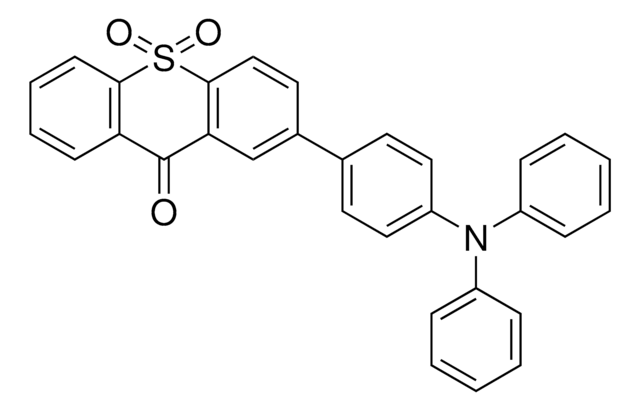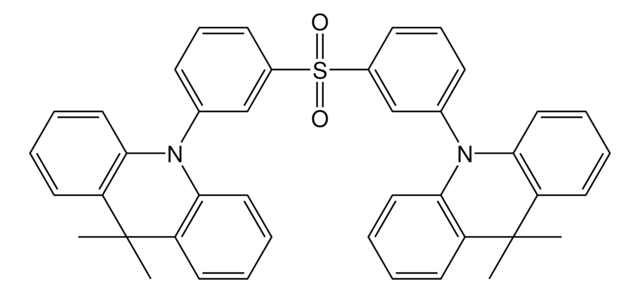900940
DMAC-DPS
sublimed
Synonym(s):
10,10′-(4,4′-Sulfonylbis(4,1-phenylene))bis(9,9-dimethyl-9,10-dihydroacridine)
About This Item
Recommended Products
description
Absorption (UV): 286 nm (in toluene)
Emission (PL): 469 nm (in toluene)
Quality Level
assay
≥99% (Sublimed, HPLC)
form
solid
SMILES string
[S](=O)(=O)(c5ccc(cc5)N6c7c(cccc7)C(c8c6cccc8)(C)C)c1ccc(cc1)N2c3c(cccc3)C(c4c2cccc4)(C)C
InChI
1S/C42H36N2O2S/c1-41(2)33-13-5-9-17-37(33)43(38-18-10-6-14-34(38)41)29-21-25-31(26-22-29)47(45,46)32-27-23-30(24-28-32)44-39-19-11-7-15-35(39)42(3,4)36-16-8-12-20-40(36)44/h5-28H,1-4H3
InChI key
CYPVTICNYNXTQP-UHFFFAOYSA-N
Looking for similar products? Visit Product Comparison Guide
General description
Application
- Diluted exciplex concentrations in organic light emitting diodes for blue-shifted spectra and improved efficiency: This study explores the use of DMAC-DPS and PO-T2T to achieve blue-shifted spectra and improved efficiency in OLEDs (J Yan, et al., 2022).
- Non-doped white organic light-emitting devices consisting of thermally activated delayed fluorescent emitters and ultrathin phosphorescent emitters: The research focuses on using DMAC-DPS as an emitting layer for high quantum efficiency in non-doped white OLEDs (Q Li, et al., 2019).
- The optical spectra of DMAC‐based molecules for organic light‐emitting diodes: A density functional theory study of DMAC-DPS and other DMAC-based molecules to understand their emission properties (Y Wang, et al., 2022).
- Highly efficient and bright blue organic light-emitting devices based on solvent engineered, solution-processed thermally activated delayed fluorescent emission layer: The study investigates the use of DMAC-DPS for efficient carrier transport and high brightness in blue OLEDs (J Yang, et al., 2019).
Storage Class
11 - Combustible Solids
wgk_germany
WGK 3
flash_point_f
Not applicable
flash_point_c
Not applicable
Choose from one of the most recent versions:
Certificates of Analysis (COA)
Don't see the Right Version?
If you require a particular version, you can look up a specific certificate by the Lot or Batch number.
Already Own This Product?
Find documentation for the products that you have recently purchased in the Document Library.
Related Content
Organic electronics utilizes organic conductors and semiconductors for applications in organic photovoltaics, organic light-emitting diodes, and organic field-effect transistors.
Our team of scientists has experience in all areas of research including Life Science, Material Science, Chemical Synthesis, Chromatography, Analytical and many others.
Contact Technical Service







iridium(III) 97%](/deepweb/assets/sigmaaldrich/product/structures/309/053/0823f035-245c-433d-b033-2eca2d931c67/640/0823f035-245c-433d-b033-2eca2d931c67.png)